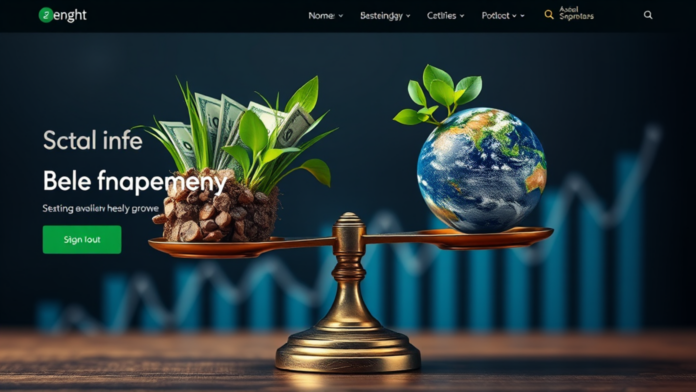Sustainable Investing: Balancing Profits and Environmental Impact
Definition and Importance
Sustainable investing refers to the practice of incorporating environmental, social, and governance (ESG) factors into investment decisions. This approach aims to generate long-term financial returns while promoting positive societal impact. Investors recognize that sustainability can enhance portfolio resilience. It is essential for future growth.
Moreover, sustainable investing addresses pressing global challenges, such as climate change and social inequality. These issues affect everyone. By aligning investments with personal values, individuals can contribute to a more sustainable future. This is a powerful choice.
Historical Context and Evolution
Sustainable investing has evolved significantly since the 1960s. Initially, it focuqed on avoiding investments in industries like tobacco and weapons. This approach laid the groundwork for today’s ESG criteria. It is a crucial development.
Over the decades, the integration of sustainability into investment strategies gained momentum. Institutional investors began recognizing the financial risks associated with environmental degradation. This awareness is vital for informed decision-making. As a result, sustainable investing has become a mainstream exercise. It reflects changing societal values .
Understanding Environmental, Social, and Governance (ESG) Criteria
What are ESG Criteria?
ESG criteria encompass three key dimensions: environmental, social, and governance factors. These metrics assess a company’s sustainability practices and ethical impact. They provide a comprehensive evaluation of risks and opportunities. This is essential for investors.
Environmental factors consider resource management and pollution. Social criteria evaluate labor practices and community engagement. Governance focuses on corporate leadership and transparency. Each aspect influences long-term performance. Understanding these criteria is crucial for informed investing.
How ESG Influences Investment Decisions
ESG factors significantly influence investment decisions by providing a framework for assessing risk and opportunity. Investors analyze these criteria to identify companies with sustainable practices. This analysis is essential for long-term viability.
Environmental performance can affect regulatory compliance and operational costs. Social responsibility impacts brand reputation and customer loyalty. Governance structures determine accountability and ethical behavior. Each factor plays a critical role in investment strategy. Understanding these influences is vital for informed choices.
The Financial Performance of Sustainable Investments
Comparative Analysis with Traditional Investments
Sustainable investments often outperform traditional investments over the long term. Studies indicate that companies with strong ESG practices tend to exhibit lower volatility. This stability is crucial for risk management.
Additionally, sustainable investments attract a growing pool of investors. This trend enhances liquidity and market intsrest. As a result, these investments can yield competitive returns. Understanding this dynamic is essential for strategic planning.
Long-term vs. Short-term Returns
Sustainable investments typically favor long-term returns over short-term gains. This approach aligns with the growing emphasis on sustainability and ethical practices. Investors often see gradual appreciation in value. It is a steady process.
In contrast, short-term investments may yield quick profits but often involve higher risks. Market fluctuations can significantly impact these returns. Understanding this difference is crucial for effective portfolio management. Long-term strategies can provide stability.
Strategies for Sustainable Investing
Positive Screening and Negative Screening
Positive screening involves selecting companies that meet specific sustainability criteria. This method emphasizes investments in firms with strong ESG performance. It is a proactive approach.
Conversely, negative screening excludes companies that engage in harmful practices. This strategy avoids sectors like fossil fuels and tobacco. Both methods help align investments with personal values. Understanding these strategies is essential for effective sustainable investing.
Impact Investing and Shareholder Advocacy
Impact investing focuses on generating measurable social and environmental benefits alongside financial returns. This strategy targets sectors like renewable energy and affordable housing. It is a purposeful investment approach.
Shareholder advocacy involves using ownership rights to influence corporate behavior. Investors engage with companies to promote sustainable practices. This method can drive significant change. Both strategies empower investors to align their portfolios with their values. Understanding these approaches enhances investment effectiveness.
Challenges in Sustainable Investing
Greenwashing and Misleading Claims
Greenwashing refers to misleading claims about a company’s environmental practices. This tactic can deceive investors seeking sustainable options. It is a significant concern in the market.
Many companies exaggerate their sustainability efforts. This can undermine genuine initiatives. Investors must critically evaluate claims to avoid pitfalls. Awareness is crucial for informed decision-making.
Market Volatility and Risk Assessment
Market volatility poses significant challenges for sustainable investing. Fluctuations can impact the performance of ESG-focused assets. This creates uncertainty for investors.
Risk assessment becomes crucial in this context. Investors must analyze both financial and non-financial risks. Understanding these factors aids in making informed decisions. Awareness of market dynamics is essential for success.
Tools and Resources for Investors
ESG Rating Agencies and Their Role
ESG rating agencies evaluate companies based on their environmental, social, and governance practices. These assessments provide investors with critical insights. This information is essential for informed decision-making.
Agencies use various methodologies to score firms. This helps identify leaders and laggards in sustainability. Investors rely on these ratings to guide their portfolios. Understanding these ratings is vital for effective investing.
Investment Platforms and Funds Focused on Sustainability
Investment platforms increasingly offer funds focused on sustainability. These platforms provide access to ESG-compliant investment options. This is beneficial for conscious investors.
Funds often target sectors like renewable energy and sustainable agriculture. They aim to generate both financial returns and positive impact. Understanding these options is crucial for strategic investing. Investors should explore available resources carefully.
The Future of Sustainable Investing
Trends Shaping the Industry
Several trends are shaping the future of sustainable investing. Increased regulatory scrutiny is driving transparency in ESG reporting. This is essential for investor confidence.
Moreover, technological advancements enhance data analysis capabilities. Investors can now access more accurate information. This leads to better decision-making. Growing consumer demand for sustainability also influences corporate strategies. Awareness is key for informed choices.
Regulatory Changes and Their Impact
Regulatory changes significantly impact sustainable investing practices. New guidelines enhance transparency in ESG disclosures. This fosters greater accountability among companies.
Additionally, stricter regulations can drive capital towards sustainable projects. Investors are increasingly prioritizing compliance. Understanding these changes is essential for strategic planning. Awareness is crucial for informed decisions.

